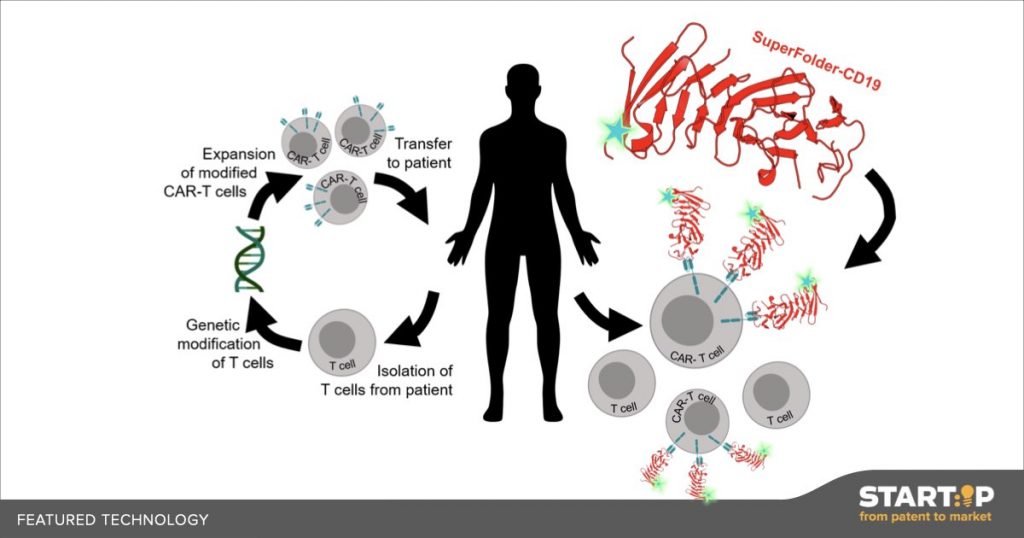CAR-T cell therapy is an exciting new form of cancer therapy that uses the patient’s own immune system to attack cancer cells. However, CAR-T cells are difficult to monitor in a patient, preventing an assessment of whether they are working or not. These researchers have developed an easy solution to study leukaemia- and lymphoma-specific CAR-T cells.
START:IP
Technologie Kurzbeschreibung (nur Englisch)
Menu
Detection of CAR-T Cells
Assessment Tool for CAR-T Cell Therapy Efficacy
Bookmark3
The difficulty with detecting CAR-T cells in patients comes from the fact that they look almost identical to an immune cell already present in the patient. This is because CAR-T cells are made from these cells. T cells are a type of immune cell that recognize malignant or infected cells and kill them. CAR-T cells are made by taking T cells from patients, engineering them to target cancer cells, and then putting them back into the patient. For B cell leukaemias and lymphomas, two CAR-T cell therapies have been approved, where the T cells have been engineered to recognize a protein present on the tumor cells called CD19. One way to study CAR-T cells after they’ve been administered is to take a patient’s blood sample and test for the presence of CD19-reactive cells, i.e., CAR T cells. In this case, one needs to have CD19 available in a test tube format, and this is really difficult for this protein. For reasons not fully understood, CD19 doesn’t like to be without a cell to hang onto and will clump into unusable protein aggregates in a test tube. These researchers have developed a stabilized version of CD19 that is happy without cells, and therefore usable for these tests. With this stabilized version, they can produce large amounts of CD19 protein that can be stored in the freezer for long amounts of time without affecting the efficacy, enabling a lot of tests for minimal cost. In the test tube, any CAR-T cells present in a patient blood sample will recognize CD19 and bind to it. This interaction can be detected, enabling a quantification of the number of CAR-T cells present. Furthermore, it allows for further analysis of the CAR-T cells, for example to study whether they are active or not (and therefore, likely to be killing the cancer). This test would occur alongside assessing the leukaemia/lymphoma progression, allowing for appropriate changes to the patient’s treatment, if necessary. Altogether, it is a simple tool to help assess a leukaemia or lymphoma patient’s treatment, and therefore make better informed decisions for that patient’s continued care.
If you click the button and fill out the form to be “matched” with a technology, we will introduce you to the scientist / transfer manager of the respective research institution. In this way, you immediately have the chance to receive more detailed information and to start discussions about a possible joint project.

Mit dem Laden des Videos akzeptieren Sie die Datenschutzerklärung von YouTube.
Mehr erfahren




